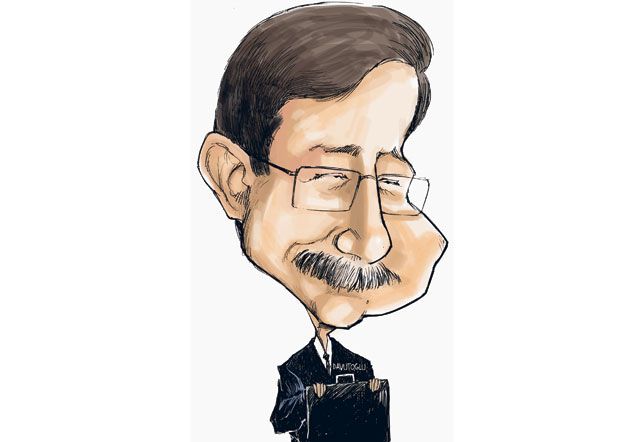Turkish Foreign Minister Ahmet Davutoglu is considered by many as the architect of Turkey's neo-foreign policy. His ‘zero-problem' approach with neighbouring countries has served as a guideline for his country's foreign policy since the ruling Justice and Development Party (AKP) came to power in 2002. Davutoglu has been particularly enthusiastic about improving ties with Syria and he has strong reasons for that.
Davutoglu realises that Syria is the only country in the region that borders the three key areas of conflict in the Middle East, namely, Iraq, Palestine and Lebanon. He believes that if Turkey wishes to have a greater role in these conflicts then Syria's strategic location must be recognised and utilised.
During the 1998 Syrian-Turkish crisis, Davutoglu was among a few Turkish academics who rejected an Israeli proposal to provide Turkey with sophisticated surveillance systems to monitor the infiltration of the Kurdistan Labour Party (PKK) fighters from Syria. For Davutoglu, the Israeli proposal was intended to isolate Turkey from its geo-political depth and prevent it from developing strong ties with its neighbours.
The victory of the AKP in the 2002 general elections provided Davutoglu with the opportunity to translate his theory into policies. His appointment by then prime minister Abdullah Gul as special foreign policy adviser transformed Turkey's regional relations.
Barely a month after the general elections, the Turkish parliament, dominated by the AKP, refused to grant the US military a launching-pad to attack Iraq. That decision was followed by hectic diplomacy led by Gul to prevent the use of military force against Iraq. Gul's regional tour started in Damascus, where he received warm official and popular welcomes. Turkey was praised by Syria for developing independent policy that stemmed from its own interests, rather than those of others.
In the following years, Turkey rejected several US requests to join efforts to isolate and destabilise the Syrian government. This position was highly appreciated in Damascus, paving the way for Turkey to play a key role in the resumption of indirect peace talks between Syria and Israel.
In the spring of 2008, Gul and his closest foreign policy advisor Davutoglu succeeded in holding the first round of indirect peace talks between Syria and Israel. When he served as a foreign minister from 2004-2008, Gul led two years of silent diplomatic efforts, culminating in the resumption of indirect negotiations between Damascus and Tel Aviv. When he was elected president of the Turkish Republic in 2008, Gul entrusted Prime Minister Recep Tayyip Erdogan with this responsibility.
Seize the opportunity
Following Erdogan's angry reaction to Israel's aggression on Gaza last year, Gul retained interest in brokering a peace treaty between Syria and Israel. Gul and Davutoglu believe that Turkey can take advantage of the Obama administration's apparent interest in reviving the Middle East peace process. To facilitate the efforts of Washington on this front, Arab countries, Davutoglu asserts, should help to bring the national reconciliation process in Palestine to a successful end. To realise this objective, Ankara recognises that a rapprochement between Damascus and Cairo is a prerequisite. The Turks have hence been trying to arrange a visit by President Bashar Al Assad to Cairo, but have so far failed. They have succeeded nevertheless in easing Syrian-Saudi tensions, which have torn the Arab world apart in the past five years.
Syrian-Turkish cooperation was not limited to the Middle East peace process or solving intra-Arab conflicts, but has also covered Iraq, wherein the two countries have much at stake. For the past few years, Damascus and Ankara have been quietly working to facilitate a rapid and smooth pullout of US forces from Iraq, preserving its Arab identity and territorial integrity and preventing partition along ethnic or sectarian lines. This agenda has drawn Damascus closer to Ankara than to Tehran.
Turkey's quite diplomacy in dealing with a range of Middle Eastern problems has made it an acceptable broker for most players in the region. Its soft power approach, devised by Davutoglu, has transformed its regional role, making it indispensable to regional security and stability. Within a few years, Turkey has moved from the sidelines to occupy centre stage in regional politics. It will indeed have the final say in deciding the future of a region that extends from the Caspian Sea to the Balkans through the Middle East.
Dr Marwan Al Kabalan is a lecturer in Media and International Relations at Damascus University.













